|
|
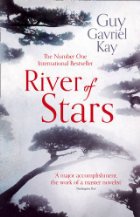 Guy Gavriel Kay has been one of my very favorite fantasy authors for years. When I first started reading his books, they seemed to fly under the radar for most other fantasy fans, and a new book by him was always a treasure. They’re never very heavy on the fantasy, but usually have a huge amount of historical influence with just a touch of mysticism. I really love this mix, because the historical backgrounds are immensely appealing to me while Kay’s ventures into fantasy allow him to create stories that resonate and have meaning. Though River of Stars is one such book, it won’t sit amongst my favorites of his works. Guy Gavriel Kay has been one of my very favorite fantasy authors for years. When I first started reading his books, they seemed to fly under the radar for most other fantasy fans, and a new book by him was always a treasure. They’re never very heavy on the fantasy, but usually have a huge amount of historical influence with just a touch of mysticism. I really love this mix, because the historical backgrounds are immensely appealing to me while Kay’s ventures into fantasy allow him to create stories that resonate and have meaning. Though River of Stars is one such book, it won’t sit amongst my favorites of his works.
Set hundreds of years after Under Heaven, River of Stars is based loosely on the period of wars that separated the Northern Song dynasty from the Southern (thank you Wikipedia as this period was completely new to me). We follow two main characters through the outcome of the wars; Lin Shan, a female poet who stands out against her contemporaries, and Ren Daiyan, a general who rises to greatness.
This book is truly a book about myth-making and how ordinary people who commit a few great deeds, or who aren’t afraid to stand up for what they think is best, pass into legend. There is a story, of course, and it’s a good one, but Kay’s writing is incredibly introspective and he spends a considerable amount of time examining what’s happened to events in their retelling. This is so extensive that the ending of the book itself isn’t concrete, letting readers make what they choose of the myths (or not). The downside of this is that he frequently foreshadows, blatantly, what’s going to happen next – the text is so self-referential that there isn’t space for surprises or suspense.
Kay’s writing is always beautiful but in this far more than any of his other books I noticed how very slow it is. Characters spend small eternities thinking and considering what has happened to them and what they might choose to do next – how their seemingly small decisions can have major impacts. It takes a very long time for the two protagonists to meet, even longer for what seems inevitable to actually occur. It’s been a long while since I read The Lions of al-Rassan or Tigana but I definitely don’t remember feeling bogged down in the same way. Every word is well-placed, but I never felt called back to this book.
Would I still recommend River of Stars? Probably. It’s a beautifully written book, very evocative of this period in China despite its slight separation as a fantasy, and very thoughtful. It’s just worth preparing for it to be a slower read.
All external book links are affiliate links. I received this book for free for review.
 I originally bought Huntress for A More Diverse Universe before I decided not to blog in November. I also didn’t manage to read it in November. But I loved Ash and I still wanted to support the initiative, even a full month late, so I recently picked it up and found myself devouring it in just a couple of days. I originally bought Huntress for A More Diverse Universe before I decided not to blog in November. I also didn’t manage to read it in November. But I loved Ash and I still wanted to support the initiative, even a full month late, so I recently picked it up and found myself devouring it in just a couple of days.
Set centuries before Ash but in the same world, two girls and a prince are tasked with making a journey to the Fairy Queen, across deadly lands with no maps, to find out why the kingdom exists in a permanent state of gray. The girls are students: Kaede, the Chancellor’s daughter who rejects her life as a proper lady, political marriage and all, and Taisin, a gifted future sage whose dreams are true visions. With them go the heir to the kingdom and three guards to the first summons to the Fay in a generation.
This book opens with a vision; Taisin sees an element of the future, but she doesn’t understand it or how she will get there. As the book unfolds, the mystery of that vision unwinds, and it’s only towards the end of the book that she, and we, understand exactly what she saw and how she needs to use it to ensure that she and those she love survive.
In Huntress, women (and girls) take on all the primary roles; Kaede and Taisin are the main characters, who go to visit a Fairy Queen, while their enemy similarly turns out to be a woman. As in Ash, the love story is between women, in a world where all love is freely accepted (although it seems political marriages still need to be between men and women in order to produce children). The change is perspective is not radical, it’s just enough to subvert expectations slightly and produces a much richer book for it.
The core of the story is an adventure into unknown lands, where mysterious perils await and some of the small band may not survive. As with all such stories, this makes it easier for us to get involved in the world as we discover new elements of the universe right along with the characters. And two diverse main characters make it easier; Taisin is destined to be a nun, or so she thinks, and acts accordingly, while Kaede wants nothing more than to live an unconventional life. Yet these two very different girls bond truly, through shared experiences and deep emotion, and their journey is one that is worth following and loving.
A quick and engaging read, Huntress is definitely recommended for other fantasy readers.
I purchased this book. All external book links are affiliate links.
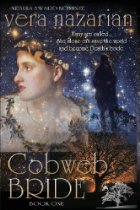 In all four corners of the world, people are about to die. Every moment, someone’s struggle comes to an end. But suddenly, death stops. No one can die, even those with mortal wounds. All of the citizens in the Kingdom of Lethe are perplexed and terrified. Battles rage on, assassinations fail spectacularly, and the elderly continue suffering past their time. Then Death himself arrives and asks for his Cobweb Bride. Only once his bride is found will death resume and the kingdom return to normal. But with no sign of the Cobweb Bride and no hints on where to find her, how will the citizens restore normality to their lives? In all four corners of the world, people are about to die. Every moment, someone’s struggle comes to an end. But suddenly, death stops. No one can die, even those with mortal wounds. All of the citizens in the Kingdom of Lethe are perplexed and terrified. Battles rage on, assassinations fail spectacularly, and the elderly continue suffering past their time. Then Death himself arrives and asks for his Cobweb Bride. Only once his bride is found will death resume and the kingdom return to normal. But with no sign of the Cobweb Bride and no hints on where to find her, how will the citizens restore normality to their lives?
Cobweb Bride is a crowd-funded phenomenon by the award-winning author Vera Nazarian. This, plus the concept of the story, had me immediately sold, and I was very eager to read this book.
This book feels unlike anything I’ve read that’s been traditionally published at the moment. It reminded me most of books that I used to read as a child, when fantasy was paramount. The descriptions are incredibly evocative and the world described, though derived from medieval Europe, feels different and special. I could picture the thin, sickly Infanta and the rosy group of girls headed off to find out if one of them was the Cobweb Bride. I could feel the cold seeping into the bones of those who should have died. I could see the royal court and the forests. For someone who isn’t a visual reader, I found this remarkable and really well done.
I also loved the concept. Nazarian doesn’t stop at the end of death for humans; animals and plants can’t die, either. This means that even food supplies are threatened, and by the middle of the book people have to rely on food that’s already dead. She envisions what happens in a body that continues working even after all the elements that make us alive have gone. It’s eerie but really thought through. And some of the conflicts that arise within the story are solely based on this, because supposedly dead people are still alive. The relations between an assassin and the person he would have successfully killed were my favorite part of the book.
Where the book falls down a bit is the way the plot is laid out. It’s a very good story, don’t get me wrong, but the beginning seems to last for a long time. Nazarian very carefully sets the scene for the rest of the book, but as a result it feels like it takes a while to get going. We’ve realized that death has stopped coming after the first two stories, so there is no further surprise factor, it’s just setting up the different storylines to interact in the rest of the book. Once those four storylines are set, I felt the book sped up considerably and I remained spellbound by the story.
Cobweb Bride ends with a lot left open, as it’s the first in a trilogy. I for one will definitely be looking forward to the next, Cobweb Empire, which is released next week on September 25th! Recommended to those who really enjoy fantasy.
All external book links are affiliate links. I received this book for free for review.
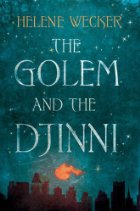 Chava, a golem only a few days old, is stranded on a boat to New York City in the early twentieth century with no idea who she is, how to live, or where to go. Ahmad is a djinn trapped in a bottle for centuries, unleashed accidentally by a Syrian metalsmith. These two unlikely friends meet and immediately understand what it is to be different from everyone around them. But as those differences force them apart, will they find their way back to one another? Chava, a golem only a few days old, is stranded on a boat to New York City in the early twentieth century with no idea who she is, how to live, or where to go. Ahmad is a djinn trapped in a bottle for centuries, unleashed accidentally by a Syrian metalsmith. These two unlikely friends meet and immediately understand what it is to be different from everyone around them. But as those differences force them apart, will they find their way back to one another?
The Golem and the Djinni is a book that I’ve seen all over the Internet in the last few months. It’s received so many positive reviews that I thought it was well worth reading, not to mention the fact that its blurb compared it to Jonathan Strange and Mr Norrell, a book that I adored. The decision was a good one as I greatly enjoyed this tale of turn of the century New York and its two unusual occupants. The book was certainly heavy on the fantasy, but it worked within the story.
One of the aspects of the book that I found very interesting was the way that the two fantasy characters got adopted into different nationalities. Both of them are effectively christened by and welcomed into the Jewish and the Syrian communities in New York, appropriately in both cases. I know life in the city was difficult for immigrants at the time, with so many seeking the American dream and failing to find that the streets were paved in gold. Instead, many of them found prejudice and further poverty. But I love stories about it anyway, particularly the way that immigrants sought familiarity and made their own little communities, and I enjoyed the way these two were still further distanced even from those immigrants. They are a world unto themselves, even while many of their experiences are echoed by others.
The fantasy aspects themselves are well integrated within the novel; I didn’t think the world felt too inconsistent. Both Chava and Ahmad belong distinctly to Old World mythology. They are creatures which have long been consigned to tales, but which truly existed in their own parts of the world. As such, when people close to them realize what they are, they often understand the nature of their beings but have a difficult time imagining that they’re real. They delve into old books and legends to find out the truth, which of course adds just another layer to the book’s appeal.
And, of course, there is the relationship between Chava and Ahmad. It took some time for them to meet, and their initial interactions are tentative, but the way they work together makes sense, even if they aren’t technically human. It was easy for me to relate to both characters and I was very invested in the outcomes of their lives.
I really enjoyed this read – I would definitely recommend The Golem and the Djinni to those who enjoy a mix of fantasy and historical fiction.
All external book links are affiliate links. I received this book for free for review.
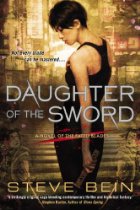 I could sum up this review with just four words: this book was awesome. I could sum up this review with just four words: this book was awesome.
Daughter of the Sword is about a group of swords created by master Japanese craftsman Inazuma. In the present day, only three swords are known, and Mariko Oshiro, the only female detective in the Tokyo Police Department, is about to become acquainted with one. Constantly fighting for her place in the department already, Mariko faces fierce sexism in her determination to prove herself. Instead of a case which is easily solved, she’s sent all the way across town to help an older man, Professor Yamada, in a seemingly inconsequential case. Twined in with her story are those of other sword owners, set in a variety of historic versions of Japan, as we learn more about the swords’ unique personalities and their context throughout history.
This book combined so many fantastic elements to create a beautifully cohesive whole that was simply a pleasure to read. I loved each and every story as we followed the swords throughout history. I’m not all that familiar with Japanese history, but I love the feel of these and I relished in the unfamiliar. I liked getting back to Mariko, but I also felt like each of the smaller stories was surprisingly fleshed out for a relatively short book. They added so much context and history which could have otherwise been lost in big city Tokyo – it’s a clever construction that adds layers of Japanese culture onto a modern day bustling city and police department.
Contrasted with these beautiful bits of history, the yakuza, or Japanese mafia, comes to light through the character of the villain, a man who has and is seduced by one sword but is determined to have two. I’d never even heard of the yakuza before, but having poked around on the internet, it appears to be a real thing, an institutionalized part of Japanese culture. He’s not exactly a pure villain, though; how many villains go and visit their fathers in the hospital in the course of a story?
And then there is Mariko herself, who is a wonderful main character, so determined and stubborn and ambitious. The sexism that she comes up against is so frustrating that I wanted to scream against her superiors myself. She is Japanese, but because she grew up in the United States instead of in Japan, she is determined to fight against the trend and make a name for herself, paving the way for other female detectives in Tokyo, while the establishment is firmly against her. This not only helps this American reader cheer her on, but gives those who are not Japanese an easy way in to start trying to come to grips with a culture that is mostly unfamiliar to us.
The fantasy touches in this book are very very light, mainly around the personalities of the swords and the way they influence their owners. I thought the focus on swords was fantastic, but I have a strange fascination with swords anyway, so your opinion of this may vary. But I love books that take a single element and use them to tie everything together, and in this case, all was beautifully done.
Very highly recommended! I can’t wait for the release of book 2 in December.
All external book links are affiliate links. I purchased this book.
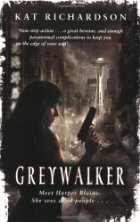 I’ll admit that I am not the world’s pickiest reader. I adore urban fantasy and I am often very willing to overlook faults in one of these books if one of the elements in the book – the world, character development, general plot, etc – stands up to me as worth reading. I have series in the genre that I adore, like the October Daye and Kate Daniel series, and I have some that I generally keep reading because they’re amusing and quick and keep my mind busy. I never know what to expect when I start a new series, and I’d heard some great reviews of Kat Richardson’s books. I’ll admit that I am not the world’s pickiest reader. I adore urban fantasy and I am often very willing to overlook faults in one of these books if one of the elements in the book – the world, character development, general plot, etc – stands up to me as worth reading. I have series in the genre that I adore, like the October Daye and Kate Daniel series, and I have some that I generally keep reading because they’re amusing and quick and keep my mind busy. I never know what to expect when I start a new series, and I’d heard some great reviews of Kat Richardson’s books.
Unfortunately, I completely failed to connect with Greywalker. I just couldn’t become invested or interested in the plot. It seemed like the heroine spent the entire book just talking to people. She’d go to the office, talk to people on the phone, go investigate in the evenings, talk to more people, and so on. It’s a shame because it starts out fantastic. She actually dies for two minutes after being attacked and, when she wakes up, discovers that she can suddenly “see” a whole other dimension of the world which is called the Grey, hence the title of the book. Unfortunately her discovery of the Grey mostly leads to her spending a lot of time talking about it, and when she does experience it, it’s mostly confusing and then needs to be explained. I still don’t really feel like I have a handle on what exactly she can do there or even what it is, probably because she spends most of the book denying that she has this new ability.
There are aspects of it that I should have liked. The setting is a good one. It feels very much like the book was set in the early 90’s. All of the characters have pagers, for one thing, which just seemed odd to me, as I’m mostly too young to have experienced the actual use of pagers in every day life. The book is set in Seattle and has a very rainy, very appropriately grey vibe pervading it. Harper also seems older than a standard urban fantasy heroine, experienced in her job and to a degree set in her ways.
But as a character, she didn’t appeal to me very much. Despite the drastic beginning of the story, she didn’t change very much, and I couldn’t understand why the main love interest was actually attracted to her, especially after a few of the events in the story took place. Not that I liked him much, either; all of the characters felt peculiarly shallow and I didn’t really care what happened to them. Harper is meant to be special, but I couldn’t really figure out why she in particular was special or what purpose she actually served that another person who could see the Grey couldn’t. Maybe my brain was just working too slowly while I was reading, but the details of the story just never fleshed out and became clear.
At this point I’m not sure I want to read the rest of the series. I’ll definitely get it out of the library if I do. Has anyone else continued reading and found it worth persevering?
I purchased this book.
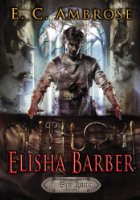 Elisha Barber lives in a fourteenth century England with witches and mages, unlike our own world, and war, poverty, and suffering, very much like it. He does all he can with his two hands, both acting as a barber, cutting and shaving men and women alike, and as a surgeon, plying the medical trade to save lives. But when he fails to save the life of his brother’s child, or indeed his brother himself, due to a feud that he initiated, Elisha can hardly live with his sins, and his capture by the king’s men is almost a mercy. Sent to practice his trade on wounded battlefield soldiers, Elisha learns to practice his true gift in the face of opposition thrown at him from every possible angle. Elisha Barber lives in a fourteenth century England with witches and mages, unlike our own world, and war, poverty, and suffering, very much like it. He does all he can with his two hands, both acting as a barber, cutting and shaving men and women alike, and as a surgeon, plying the medical trade to save lives. But when he fails to save the life of his brother’s child, or indeed his brother himself, due to a feud that he initiated, Elisha can hardly live with his sins, and his capture by the king’s men is almost a mercy. Sent to practice his trade on wounded battlefield soldiers, Elisha learns to practice his true gift in the face of opposition thrown at him from every possible angle.
This book starts off rocky. It’s hard to explain why; I think it just took a little while for the book to find its purpose and its actual story. The first few chapters are almost like a prologue, an explanation as to why Elisha gets where he’s going, and as such don’t really feel like they fit the story as well as they might. Once I’d persevered past that point, though, I could see why it was chosen to go first, because the rest of the story can’t happen without it. It’s worth continuing, in any case, if you do find yourself somewhat stuck there, as what comes after is a lot better than the beginning.
Mainly, this is because we see Elisha in his element, and start to actually learn more about the world that he lives in. His skills as a medical practitioner start to come through, and we can admire the fact that he’s saving men’s lives and fighting in the face of “modern” medicine. Of course, some medieval medicine did more harm than good, while some actually was perfectly sufficient, and Elisha experiences both kinds, although more of the former than the latter.
In terms of characterization, Elisha is the only character that we actually come to know particularly well; the book is experienced exclusively through his perspective, although it’s narrated in third person. Everyone else seems to be the mirrors through which he discovers himself and what he can actually do. Most of the characters are either good or bad, aside from a couple whose intervention changes his life at various times. A lot of the characters are somewhat stereotypical peasants with hearts of gold, while the truly “bad” characters are nobility. But there is enough variation amongst the nobility to avoid falling into any traps, and in any case, Elisha is the star of the show, with the book a bit too short for us to get to know anyone else particularly well.
Finally, the magic system. Mages in this book have a few skills; they can talk to one another through various mediums and they can transform similar objects into other objects. They also seem able to feel other people’s emotions by attuning themselves to the environment and other people, but I felt like that particular skill wasn’t as well defined. There are other abilities too, but they were also not as clearly defined, leaving me to wonder what else the author might come up with!
In all, Elisha Barber was a very solid, ultimately enjoyable read – a great choice for someone who enjoys reading about medieval England and fantasy rolled up into one. I’ll definitely keep my eyes open for the next in the series.
All external book links are affiliate links. I received this book for free for review.
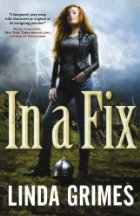 Ciel Halligan is a chameleon-like aura adapter; she can change shape to look and sound just like anyone she touches. She runs her own little business and transforms into her clients to get them out of sticky situations and endure events that they simply can’t take. Her latest job is persuading a client’s boyfriend, Trey, to propose on vacation. Everything’s going perfectly until the villa explodes, Trey disappears, and Ciel’s friends Mark and Billy turn up to protect her. The villains? Modern-day Vikings who have it in for both Ciel and the male population. Ciel Halligan is a chameleon-like aura adapter; she can change shape to look and sound just like anyone she touches. She runs her own little business and transforms into her clients to get them out of sticky situations and endure events that they simply can’t take. Her latest job is persuading a client’s boyfriend, Trey, to propose on vacation. Everything’s going perfectly until the villa explodes, Trey disappears, and Ciel’s friends Mark and Billy turn up to protect her. The villains? Modern-day Vikings who have it in for both Ciel and the male population.
Urban fantasy has been my addiction for some time now, and I’m always eager to add a new series to my shelves while I wait for other authors to release further books in my already-beloved series. In a Fix is definitely on the lighter side of the urban fantasy spectrum, and not precisely “urban” either, as there isn’t a focal city in the book as there is in so many of them.
I liked the initial idea behind this book, with shapeshifters who basically take on the difficult situations of others as a job. There are plenty of times when I think we’d all like to hire a duplicate of ourselves to deal with an event that we really couldn’t be bothered with ourselves.
Unfortunately, I really didn’t like much else about this book at all. The main character, Ciel, was so irresponsible that she drove me insane. She needed to be rescued by her male cohorts what seemed like every other page, as she went charging in no matter what, sometimes only seconds behind them. There are only so many times I can deal with someone getting caught by the exact same bad guys because of their own stupidity. She doesn’t even start off well, as her first job has a contract that allows her to sleep with another woman’s boyfriend / planned-to-be fiance for the purposes of securing “the ring”. That whole scenario makes me feel uncomfortable. The fact that the book later features a love triangle also served to put me off, as she mostly seems indecisive but keen to take whatever she can get in the meantime. Eh.
In some instances, characters that aren’t likeable can be redeemed by a good plot, but this one just became silly over the course of the book. I’m sure this book is aiming more at a quick, fun read than anything else, but I suppose I just prefer my urban fantasy reads to be at least somewhat serious and believable (in the context of their own fantasy worlds, that is). I didn’t experience that here, and overall the book let me down.
In a Fix seems like it would suit someone looking for a light, casual, funny read; when it comes to urban fantasy, it’s a bit of a let-down. I won’t be continuing with any further books in the series.
All external book links are affiliate links. I received this book for free for review.
 George is living out the fairly boring life of a middle-aged divorced “good guy” until one night he hears a strange noise outside his house. He finds a crane, her wing pierced by an arrow; he saves her and she flies away. The next day, a beautiful, somehow old fashioned woman called Kumiko appears outside his print shop, and he falls in love with her almost immediately. George’s adult daughter, Amanda, is mystified and somewhat jealous, living out her own life as a single mother with a small child and feeling as though she’s never quite fit in. In small, significant ways, Kumiko starts to change their lives, but never quite lets them into her own. George is living out the fairly boring life of a middle-aged divorced “good guy” until one night he hears a strange noise outside his house. He finds a crane, her wing pierced by an arrow; he saves her and she flies away. The next day, a beautiful, somehow old fashioned woman called Kumiko appears outside his print shop, and he falls in love with her almost immediately. George’s adult daughter, Amanda, is mystified and somewhat jealous, living out her own life as a single mother with a small child and feeling as though she’s never quite fit in. In small, significant ways, Kumiko starts to change their lives, but never quite lets them into her own.
A re-telling of a Japanese folk tale, The Crane Wife felt to me like an odd mix of beauty and disappointment. In parts of the book, like the actual stories of the tiles, I felt that I could feel the gorgeous writing and meaning I’d found in Patrick Ness’s other works shine through. In most of the book, though, I felt disappointment, as something I’d expected to love fell apart with every page.
Perhaps this book just fell prey to the fact that I really don’t much like stories set in the “real world”. I may be the only person who just didn’t appreciate the fact that George is relieving himself in the middle of the night when he hears the crane on the very first pages of the book. I can, in a way, see how Ness was trying to juxtapose the ordinary with the fantastic, by bringing George right into our world with one of humanity’s most basic needs alongside the crane’s mysterious call and appeal. I can see that, but it’s something that I wasn’t looking for, and so the book hit a wrong note with me immediately.
Plus, the book is insistent on the fact that George is a good, nice guy. He’s one of these nice guys who seems to vaguely feel like the world owes him something for being nice; he has infinite female friends but he’s just too nice for any of them to love him, and his ex-wife actually says this in the course of the book. I don’t like this stereotype; the world doesn’t owe anyone anything and I actually think that there are plenty of women who would love a nice guy (I married one, after all). I also felt that, as the book went on, he actually proved more or less that he wasn’t really that nice a guy.
Much of the book also felt a little bit like it was trying too hard to say something meaningful. Patrick Ness’s other books are incredible and subtle; A Monster Calls affected me so much that I never actually managed to write anything about it because if anything I felt too much. With this book, I honestly just felt distanced from the characters and the story, almost as though I could see how the weaving was meant to affect me without it actually happening.
That’s not to say it’s all bad; I found some beautiful passages within the book, and I almost felt as though the interludes about the woman and the volcano could have worked as a short story on their own. Here’s one that I marked:
Her hand is raised, ready to fall, ready to end this torment, which she will admit, if only to herself, is as bad for her as it has ever been for him. She loves him and it is impossible. She hates him and that is impossible, too. She cannot be with him. She cannot be without him. And both are burningly, simultaneously true in a way that grinds the cliché into dust. (210)
I actually appreciated the message that we need to trust, to believe that those we love will love us back. But I think some of the meaning of the book slipped through the cracks for me.
I wanted to love this book, but it just didn’t happen, and in the end, I feel more disappointed by that than anything else.
I received this book for free for review.
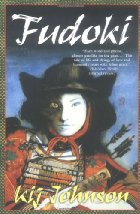 Princess Harueme has lived her life in the shadow of Japanese emperors. In the winter of her years, though, she needs to leave court and head to a convent, where she already knows she will die. Compelled to fill empty notebooks, Harueme begins telling the story of Kagaya-hime, a cat who has lost her family and her fudoki due to a horrible fire in the middle of her city. As the story progresses, Harueme intertwines the tale of her own life with Kagaya-hime’s, and we slowly learn about these two women and their individual struggles. Princess Harueme has lived her life in the shadow of Japanese emperors. In the winter of her years, though, she needs to leave court and head to a convent, where she already knows she will die. Compelled to fill empty notebooks, Harueme begins telling the story of Kagaya-hime, a cat who has lost her family and her fudoki due to a horrible fire in the middle of her city. As the story progresses, Harueme intertwines the tale of her own life with Kagaya-hime’s, and we slowly learn about these two women and their individual struggles.
I never doubt Ana when she recommends a book and this is one I can specifically trace back to her recommendation. I could not resist the idea of this cat-turned-woman story. Even so, as with so many books, it sat on my wishlist until a friend bought it for me, and then I finally read it – and, of course, I loved it. It immediately drew me in with the tale of a tortoiseshell cat who loses her entire family and just barely survives the fire; it’s sad, but poignantly written, and it felt just pitch-perfect. The book remains just that perfectly and magnificently written.
This story of intertwined women shines so brightly and has so many things to say about life that I’m not even sure I can review it properly. It’s one of those books that illuminates things that I hadn’t necessarily thought about, but in a way that stuck me as perfect.
Perhaps some quotes can illustrate this better than I can:
What man, what lost love or deceased kinsman is worth death? The space in my life that my half-brother once filled is now an aching icy pain, like the hole left after a tooth is pulled, and I am dying in weeks or months – and yet I still fight for life, as every mouse does, until the final beak-blow. The grace in tragedy is not to succumb, but to fight on. (87-88)
It’s such a beautiful book. I loved the format with the story of the two women, I loved Kagaya-hime’s cat-like sensibilities, I loved Harueme’s thoughtful reflections on her life gone by. It’s a book to make me wish I was more articulate so I could explain better just why it appealed to me. I haven’t read The Fox Woman which is Johnson’s first book, but I wish that I had, as I’ve read that the books are connected in small ways. In a way, though, I’m glad, because it’s an excuse to read this book again.
Another quote:
Domei once told me that he missed war.
“How can you?” I asked, shocked.
He was drunk and more candid than usual: he slurred as he spoke. ” I have never had such good friends.”
“You are surrounded by people who love you,” I said, “and no one is dying here.” How could war be better than this? Than me?
“We are all dying,” he said. “We just forget that when nothing is trying to kill us.” (233)
Very highly recommended.
|
|
 Guy Gavriel Kay has been one of my very favorite fantasy authors for years. When I first started reading his books, they seemed to fly under the radar for most other fantasy fans, and a new book by him was always a treasure. They’re never very heavy on the fantasy, but usually have a huge amount of historical influence with just a touch of mysticism. I really love this mix, because the historical backgrounds are immensely appealing to me while Kay’s ventures into fantasy allow him to create stories that resonate and have meaning. Though River of Stars is one such book, it won’t sit amongst my favorites of his works.
Guy Gavriel Kay has been one of my very favorite fantasy authors for years. When I first started reading his books, they seemed to fly under the radar for most other fantasy fans, and a new book by him was always a treasure. They’re never very heavy on the fantasy, but usually have a huge amount of historical influence with just a touch of mysticism. I really love this mix, because the historical backgrounds are immensely appealing to me while Kay’s ventures into fantasy allow him to create stories that resonate and have meaning. Though River of Stars is one such book, it won’t sit amongst my favorites of his works.

 I originally bought Huntress for
I originally bought Huntress for  In all four corners of the world, people are about to die. Every moment, someone’s struggle comes to an end. But suddenly, death stops. No one can die, even those with mortal wounds. All of the citizens in the Kingdom of Lethe are perplexed and terrified. Battles rage on, assassinations fail spectacularly, and the elderly continue suffering past their time. Then Death himself arrives and asks for his Cobweb Bride. Only once his bride is found will death resume and the kingdom return to normal. But with no sign of the Cobweb Bride and no hints on where to find her, how will the citizens restore normality to their lives?
In all four corners of the world, people are about to die. Every moment, someone’s struggle comes to an end. But suddenly, death stops. No one can die, even those with mortal wounds. All of the citizens in the Kingdom of Lethe are perplexed and terrified. Battles rage on, assassinations fail spectacularly, and the elderly continue suffering past their time. Then Death himself arrives and asks for his Cobweb Bride. Only once his bride is found will death resume and the kingdom return to normal. But with no sign of the Cobweb Bride and no hints on where to find her, how will the citizens restore normality to their lives? Chava, a golem only a few days old, is stranded on a boat to New York City in the early twentieth century with no idea who she is, how to live, or where to go. Ahmad is a djinn trapped in a bottle for centuries, unleashed accidentally by a Syrian metalsmith. These two unlikely friends meet and immediately understand what it is to be different from everyone around them. But as those differences force them apart, will they find their way back to one another?
Chava, a golem only a few days old, is stranded on a boat to New York City in the early twentieth century with no idea who she is, how to live, or where to go. Ahmad is a djinn trapped in a bottle for centuries, unleashed accidentally by a Syrian metalsmith. These two unlikely friends meet and immediately understand what it is to be different from everyone around them. But as those differences force them apart, will they find their way back to one another? I could sum up this review with just four words: this book was awesome.
I could sum up this review with just four words: this book was awesome. I’ll admit that I am not the world’s pickiest reader. I adore urban fantasy and I am often very willing to overlook faults in one of these books if one of the elements in the book – the world, character development, general plot, etc – stands up to me as worth reading. I have series in the genre that I adore, like the October Daye and Kate Daniel series, and I have some that I generally keep reading because they’re amusing and quick and keep my mind busy. I never know what to expect when I start a new series, and I’d heard some great reviews of Kat Richardson’s books.
I’ll admit that I am not the world’s pickiest reader. I adore urban fantasy and I am often very willing to overlook faults in one of these books if one of the elements in the book – the world, character development, general plot, etc – stands up to me as worth reading. I have series in the genre that I adore, like the October Daye and Kate Daniel series, and I have some that I generally keep reading because they’re amusing and quick and keep my mind busy. I never know what to expect when I start a new series, and I’d heard some great reviews of Kat Richardson’s books. Elisha Barber lives in a fourteenth century England with witches and mages, unlike our own world, and war, poverty, and suffering, very much like it. He does all he can with his two hands, both acting as a barber, cutting and shaving men and women alike, and as a surgeon, plying the medical trade to save lives. But when he fails to save the life of his brother’s child, or indeed his brother himself, due to a feud that he initiated, Elisha can hardly live with his sins, and his capture by the king’s men is almost a mercy. Sent to practice his trade on wounded battlefield soldiers, Elisha learns to practice his true gift in the face of opposition thrown at him from every possible angle.
Elisha Barber lives in a fourteenth century England with witches and mages, unlike our own world, and war, poverty, and suffering, very much like it. He does all he can with his two hands, both acting as a barber, cutting and shaving men and women alike, and as a surgeon, plying the medical trade to save lives. But when he fails to save the life of his brother’s child, or indeed his brother himself, due to a feud that he initiated, Elisha can hardly live with his sins, and his capture by the king’s men is almost a mercy. Sent to practice his trade on wounded battlefield soldiers, Elisha learns to practice his true gift in the face of opposition thrown at him from every possible angle. Ciel Halligan is a chameleon-like aura adapter; she can change shape to look and sound just like anyone she touches. She runs her own little business and transforms into her clients to get them out of sticky situations and endure events that they simply can’t take. Her latest job is persuading a client’s boyfriend, Trey, to propose on vacation. Everything’s going perfectly until the villa explodes, Trey disappears, and Ciel’s friends Mark and Billy turn up to protect her. The villains? Modern-day Vikings who have it in for both Ciel and the male population.
Ciel Halligan is a chameleon-like aura adapter; she can change shape to look and sound just like anyone she touches. She runs her own little business and transforms into her clients to get them out of sticky situations and endure events that they simply can’t take. Her latest job is persuading a client’s boyfriend, Trey, to propose on vacation. Everything’s going perfectly until the villa explodes, Trey disappears, and Ciel’s friends Mark and Billy turn up to protect her. The villains? Modern-day Vikings who have it in for both Ciel and the male population. George is living out the fairly boring life of a middle-aged divorced “good guy” until one night he hears a strange noise outside his house. He finds a crane, her wing pierced by an arrow; he saves her and she flies away. The next day, a beautiful, somehow old fashioned woman called Kumiko appears outside his print shop, and he falls in love with her almost immediately. George’s adult daughter, Amanda, is mystified and somewhat jealous, living out her own life as a single mother with a small child and feeling as though she’s never quite fit in. In small, significant ways, Kumiko starts to change their lives, but never quite lets them into her own.
George is living out the fairly boring life of a middle-aged divorced “good guy” until one night he hears a strange noise outside his house. He finds a crane, her wing pierced by an arrow; he saves her and she flies away. The next day, a beautiful, somehow old fashioned woman called Kumiko appears outside his print shop, and he falls in love with her almost immediately. George’s adult daughter, Amanda, is mystified and somewhat jealous, living out her own life as a single mother with a small child and feeling as though she’s never quite fit in. In small, significant ways, Kumiko starts to change their lives, but never quite lets them into her own. Princess Harueme has lived her life in the shadow of Japanese emperors. In the winter of her years, though, she needs to leave court and head to a convent, where she already knows she will die. Compelled to fill empty notebooks, Harueme begins telling the story of Kagaya-hime, a cat who has lost her family and her fudoki due to a horrible fire in the middle of her city. As the story progresses, Harueme intertwines the tale of her own life with Kagaya-hime’s, and we slowly learn about these two women and their individual struggles.
Princess Harueme has lived her life in the shadow of Japanese emperors. In the winter of her years, though, she needs to leave court and head to a convent, where she already knows she will die. Compelled to fill empty notebooks, Harueme begins telling the story of Kagaya-hime, a cat who has lost her family and her fudoki due to a horrible fire in the middle of her city. As the story progresses, Harueme intertwines the tale of her own life with Kagaya-hime’s, and we slowly learn about these two women and their individual struggles.






Recent Comments